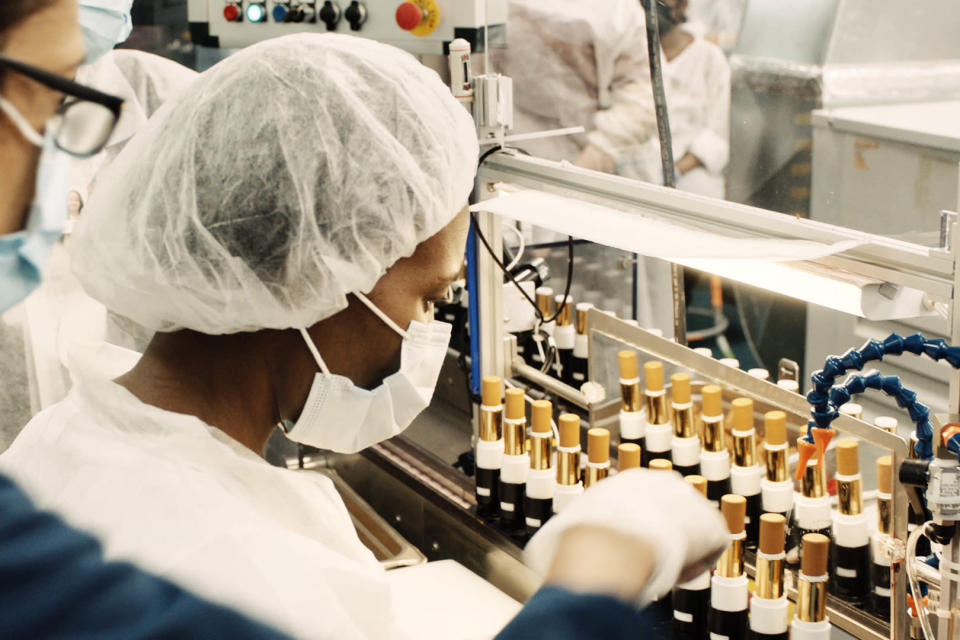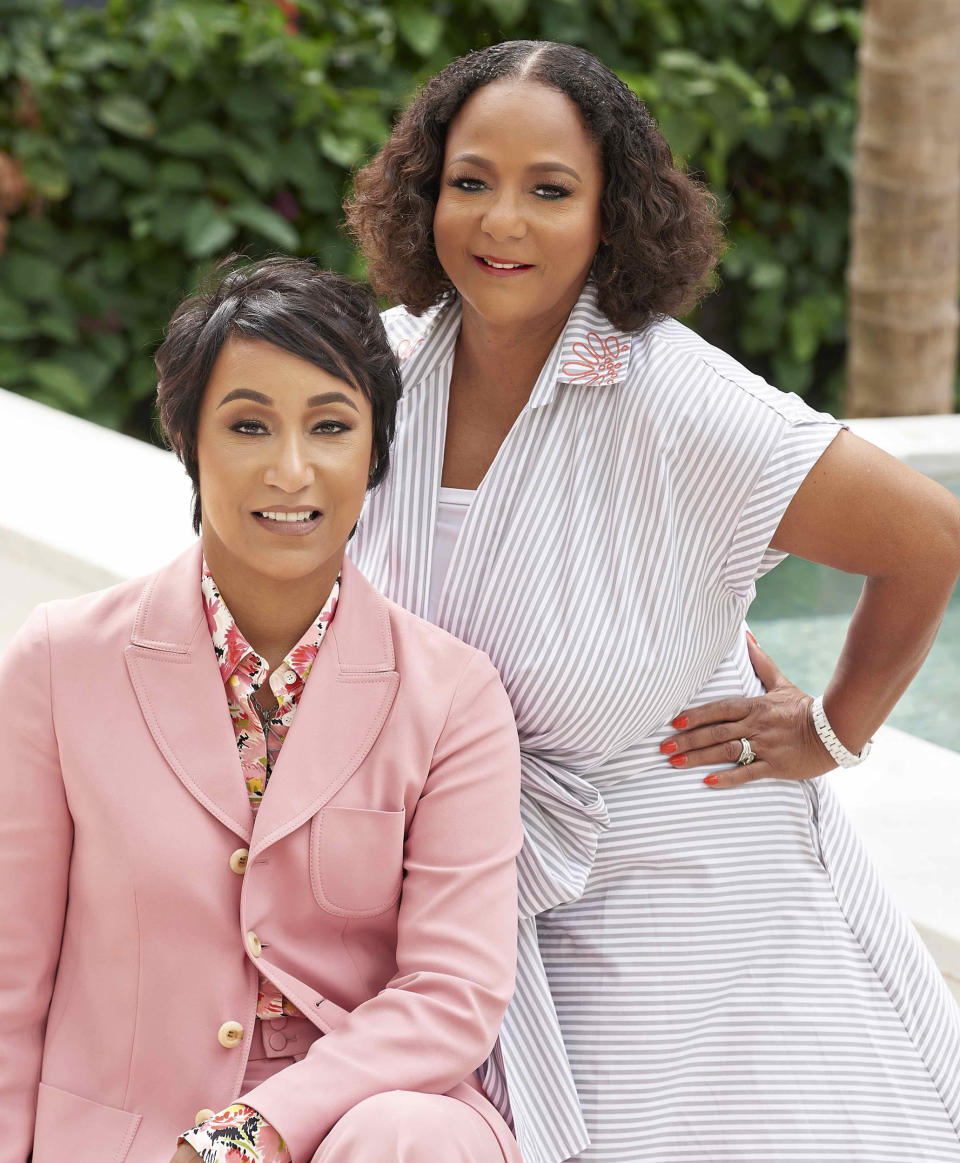How Fashion Fair is helping Black women in the beauty industry
[ad_1]
In the new documentary “The Beauty of Blackness,” Grammy Award-winning singer and actor Kelly Rowland reveals a hidden struggle that affected her confidence onstage: finding makeup that matched her complexion.
“It’s so unfortunate, because I remember talking to other models, like supermodels, who said they had the same situation,” Rowland said in the documentary. “They would fix it up themselves — and here we are, 20 years later, and they’re figuring it out, still.”
“The Beauty of Blackness,” now available on HBO Max, follows the cross-generational journey of Fashion Fair, one of the first Black-owned makeup lines. It follows co-owners Desiree Rogers and Cheryl Mayberry McKissack on their path of acquiring the brand, the challenges they experienced along the way and the impact Fashion Fair is making in the Black community.

When beauty pioneer Eunice Johnson launched her cosmetics line Fashion Fair in 1973, she created a new space for Black women in the industry. Johnson — also the wife of John H. Johnson, the founder of Jet and Ebony magazines — designed makeup specifically for women of darker skin tones who were often unable to find products to match their complexion. The company became one of the first Black-owned international cosmetic lines and broke racial barriers in business by celebrating Black beauty.
Advertisement
Advertisement
Advertisement
Fashion Fair went out of business for more than two years before Rogers and McKissack purchased the brand in October 2019. After reaching the peak of its commercial success in 2003, the company declined due to its inability to keep up with the heightened demand and increasing competition from other brands that started carrying shades for Black women. The closing of numerous department stores where Fashion Fair sold its products also contributed to the company’s demise.
After discovering that Fashion Fair was headed toward bankruptcy court, Rogers and McKissack were granted ownership of the brand after winning a bid during an auction.
“I think there’s a great entrepreneurial message that sometimes things are not the way that they should be, or the ways that could be, and so we have to take it upon ourselves to make those changes,” McKissack told NBC News.

Black women often face hurdles in the beauty industry, both in the lack of makeup products for those with darker skin tones and the lack of representation in who owns the companies.
Advertisement
Advertisement
In 2019, Black consumers accounted for almost 90 percent of the money spent on ethnic hair and beauty products, according to Nielsen. Yet Black ownership is not reflective of this outsize influence: Black-owned beauty brands represent only 4 percent of high-end makeup sales. Even with the 15 Percent Pledge, an initiative encouraging retailers to dedicate at least 15 percent of their shelf space to Black-owned businesses, many still lack these products, McKissack said.
When Rogers entered the entrepreneurial world, she faced obstacles that many Black women can relate to: She was part of the first generation in her family to go to business school and came from a family that wasn’t wealthy. Fueled by her own experience, she wants to ensure that there’s a safe space for dialogue among other Black business leaders regarding challenges their companies may face as they grow, she said.
Black-owned businesses have a short life span, according to 2021 data provided by McKinsey & Company’s inclusive consumer survey: Only 4 percent stay in operation for a little over three years, compared to the 55 percent average for all businesses. Factors such as lack of geographical connections to resources, as well as a mistrust of institutions, were barriers Black entrepreneurs faced in getting support for their businesses, according to a 2020 McKinsey report.
“It’s about product development,” Rogers said. “It is about getting into distribution. It’s about launching your product. … They’re real business concerns that you need to address and talk through as you grow.”
In its nearly 50-year history, the makeup brand has raised more than $55 million for the Black community through charity events. Fashion Fair also created a scholarship fund for Spelman College students pursuing a career in entrepreneurship. Students will also have the opportunity to participate in an internship — with the aim of providing them tools to successfully navigate business in the real world.

In November, the company initiated “The Art of Shade Matching,” a monthlong, nationwide promotional event encouraging women to travel to Sephora and find their matching foundation. At one of the events in New Orleans, which featured a performance by rapper Big Freedia, McKissack said she was approached by a Chicago woman who shared how Fashion Fair was the only makeup able to cover her daughter’s birthmark, which helped boost her confidence.
Advertisement
Advertisement
McKissack said Fashion Fair not only had “great meaning” for the woman, but also for her daughter. “So that’s that cross-generational experience that just can’t be matched,” she said.
While brainstorming ways to reach consumers, Rogers said she would ask herself, “What would Mrs. Johnson do?”
“It’s really important that we can appeal to a cross section of women of color,” McKissack said, “because we have the same needs even though we may like different things.”
Rogers said that at one of their events in Chicago, people were brought to tears over the nostalgia the brand brings — showing how the older generations who grew up with the brand now see their children and grandchildren using the products.
“They know that we’re going to take care of them,” Rogers said. “You’re not going to get there and not find your shade, or feel like, ‘Oh, gosh, this doesn’t look like me.’ We’re doing this with love because we are you. I think everyone at some level wants to look good to themselves — in terms of what they’ve chosen and how they’re presenting themselves — and it shouldn’t be that hard of a process.”
Advertisement
Advertisement
By bringing the brand back, Rogers and McKissack are incorporating nearly 50 years of knowledge in the world of skin care.
“For so many years, we have not been a part of the decision-making process,” Rogers said. “We have not been able to say, ‘No, we want this and not only do we want it, we’re going to do it ourselves and get it out there in a significant way across the country.’”
[ad_2]
Source link
